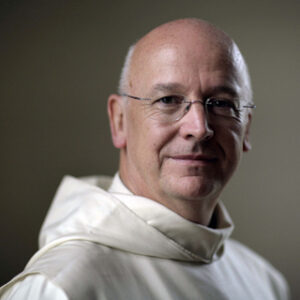 Laurence Freeman is a Benedictine monk and teacher and is Director of The World Community for Christian Meditation (WCCM) a global, inclusive contemplative community. He resides at the international centre of the WCCM at Bonnevaux Centre for Peace near Paris.
Laurence Freeman is a Benedictine monk and teacher and is Director of The World Community for Christian Meditation (WCCM) a global, inclusive contemplative community. He resides at the international centre of the WCCM at Bonnevaux Centre for Peace near Paris.
With Irish and English roots, he was educated by the Benedictines and studied English Literature at New College, Oxford University. Before entering monastic life, he worked with the United Nations in New York, in Banking and Journalism.
Fr. Laurence is a monk of the Benedictine Congregation of Monte Oliveto Maggiore. John Main was his teacher and Fr. Laurence assisted him in establishing the foundations of the Community. Laurence is the author of a number of books on Meditation. He teaches meditation in religious and secular contexts and works in interfaith dialogue. He travels extensively teaching and leading Retreats dialogues. Laurence sees meditation as opening the common ground of humanity and developing the contemplative consciousness that he believes the world today needs for its survival.
Some of the points discussed in this conversation:
- “Meditation itself is a universal wisdom, we find it in all the great spiritual families.”
- Lawrence’s introduction to meditation by John Main. John Main’s background.
- The roots of the mantra meditation taught by the World Community for Christian Meditation (WCCM): its connection with Ramana Maharshi and the Christian tradition of the desert fathers and John Cassian.
- “Meditation is a work of attention that gives deep care to the soul.”
- The loss of esoteric knowledge in the Cristian tradition.
- Three elements of religion: Mystical, Institutional, Intellectual.
- How easily the subtle and mystical elements of a religion can be lost.
- The distinction between contemplative consciousness and transitory yet transformative mystical experiences.
- Mindfulness is helpful but is preparatory for the deeper and more transformative work of single-pointed meditation.
- The inevitability of a “dark night” or purificatory stage.
- How a connection with your deeper self can transform the dying experience.
- The best scientists are mystics.
- The influence on society of the materialist paradigm, which fails to recognize that consciousness is fundamental.
- An encounter with the meaning of suffering at the heart of all great mystical traditions.
- Finding the still point within ourselves and meeting others from that place is a fundamental prerequisite to solving global problems.
- Importance of community.
- Convening leaders who understand the importance of contemplative consciousness and how this might transform the world.
- Connecting contemplative practice with the work necessary to heal the world.
- Can meditation alone ensure moral clarity? The issue of ethical integrity in the spiritual community.
- Good work is that which brings out the best in you and will bring benefits to others – that’s ‘virtue’.
- “The fruits of the spirit are actually the life of God, burgeoning in your humanity.”
- “God became human so that human beings might become God.” If some Christians find this blasphemous, they should read the early Church fathers.
- Emptiness versus fullness in the Cristian tradition.
- St. Irenaeus: “We can never know God as an object, we can only know God by participating in his own self-knowledge”.
- Reincarnation vs. resurrection vs. purgatory.
- Meditation is the journey from the mind, into the heart.
- Three stages of meditation.
- 3-minute group meditation.
- How to learn more about Lawrence’s work.
Books
- Jesus the Teacher Within
- Good Work: Meditation for Personal & Organisational Transformation
- Christian Meditation: Your Daily Practice
- Light Within: Meditation as Pure Prayer
Discussion of this interview in the BatGap Community Facebook Group.
Interview recorded June 5, 2021
Video and audio below. Audio also available as a Podcast.
YouTube Video Chapters:
- 00:00:00 – Introduction to Buddha at the Gas Pump
- 00:03:01 – The Roots of Meditation in Christianity
- 00:06:32 – The Roots of Meditation
- 00:09:49 – The Radically Simple Way of Meditation
- 00:12:42 – The Mantra in Christian Prayer
- 00:15:13 – The Cycle of Losing and Finding
- 00:17:42 – The Flowing Tradition of Christianity
- 00:20:53 – Rediscovering the Mystical Dimension of Religion
- 00:24:42 – The Growth of Contemplative Consciousness
- 00:31:19 – Transformational Effects in Your World and Work
- 00:36:30 – The Progressive Development of Consciousness
- 00:42:20 – The Relevance of Meditation to the Deeper Meaning of Life
- 00:50:16 – Pursuing Happiness and the Meaning of Suffering
- 00:55:27 – Nurturing a Community of Love and Faith
- 01:00:05 – The Influence of Consciousness and Leadership in Society
- 01:04:32 – The Loss of the Moral Consensus
- 01:09:51 – Ethical Integrity in the Spiritual Community
- 01:15:40 – The Fruits of the Spirit
- 01:20:44 – Jesus’ Miracles and Compassion
- 01:26:03 – The Shared Divinity of Humanity
- 01:30:31 – The Emptying of God and the Fullness of Self
- 01:36:24 – The Question of Identity
- 01:40:51 – The Stories and Questions of Jesus’ Life
- 01:46:05 – The Debate on Reincarnation and its Importance
- 01:50:46 – The Concept of Purgatory and Reincarnation
- 01:54:41 – The Practice of Meditation
- 01:59:25 – The Work of Meditation
- 02:03:08 – Introduction to Meditation
- 02:08:24 – Conclusion and Resources
- 02:13:18 – Daily Wisdom and Community Building
- 02:16:28 – Farewell and Future Endeavors
Podcast: Play in new window | Download
Subscribe: Apple Podcasts | Spotify | Android | Email | TuneIn | RSS | More
